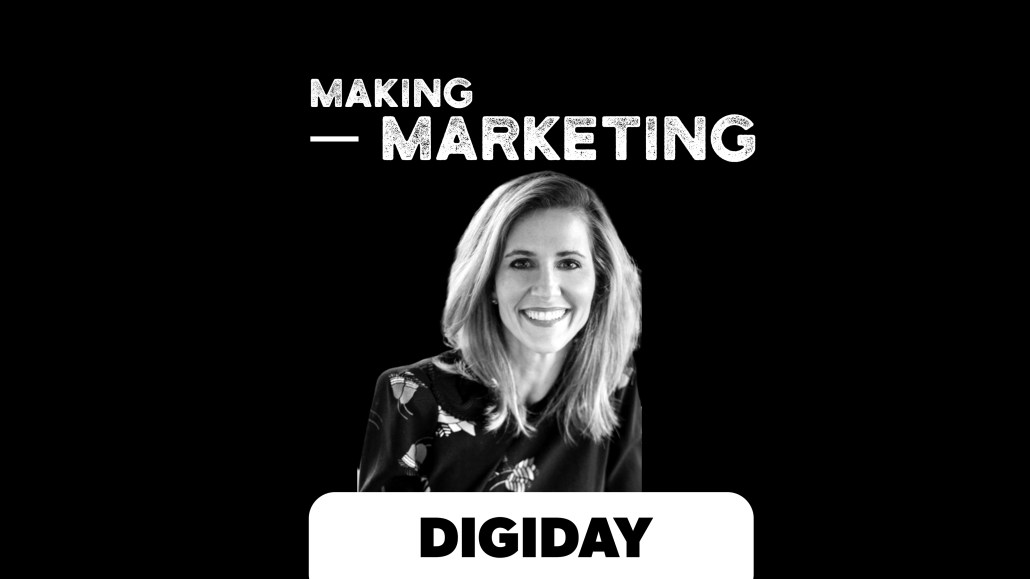Secure your place at the Digiday Media Buying Summit in Nashville, March 2-4
Deloitte Digital’s Alicia Hatch: We are ready to put skin in the game

Subscribe: iTunes | Google Play | Stitcher | RSS | Anchor
Consultancies are turning into agencies as agencies grapple for a seat at the table. Alicia Hatch, CMO of Deloitte Digital, the $1 billion ad agency that sits within Deloitte, has insight into why consultancies are built for the modern CMO.
“We didn’t sit in the war room and say ‘we’re going to set our sights on that industry and we’re moving in and taking over,’” said Hatch. “Right now, the life span of companies is getting shorter and shorter. How do you help a company make the transition? We understand the CMO’s power role in it if they can step into it. We have to help the CMO and the CIO as well as the CTO and CDO and others. It’s all tied together and that’s why the industry became relevant.”
On this week’s episode of Making Marketing, Hatch discussed the pressures on today’s CMO, why Deloitte believes in having skin in the game, and why in-house doesn’t scare her. Edited highlights below.
The economy for marketing has changed.
“Disruption is an insufficient word for what’s underlying this change in the industry. We built the industry construct in the era of industrialization in a supply-driven economy. In a connected world, consumers have been empowered individually and collectively. We are now in a demand-driven economy. We’re replacing industries with human needs.”
Marketers help brands drive growth and also get deep audience insight.
“[CMOs should have] a seat at the strategy table in the board room. Companies winning now have completely reoriented their entire operation around the customer and not just the marketing. Marketers are in a position to pull the insights out of an audience that can drive innovation. More innovation is driven out of novel use of products and services by customers than the R&D department typically. In addition to speaking the language of business, you’re reporting on business metrics instead of marketing metrics. Seventy-three percent of CMOs own P&Ls now. Top-line growth is not easy to get to. You can always cut to the bottom line. If you can mastermind the top-line, it’s amazing.”
The goal is to build in-house capability enough and then walk away.
“You have to be absolutely bolted on seamlessly to the brand you’re helping. We hope we can strengthen the in-house organization to the extent that we can walk away. In a world of change, there is no lack of jobs. We’re looking at capacity-building and helping to transfer value into the company. Within that, it’s the Uber for talent. We look at the best way to augment that team. We are so ready to put skin in the game. Often times, the business is not there yet. The brand does not have the internal models to pay that way. That has to evolve. For those who can take that on, it’s a genius approach. We can play along, we’re a private company. We’re growing 30 percent year-over-year. So there’s a little less worry about working ourselves out of a job because we’re always growing.”
The competition from agencies and publishers is not a concern.
“We’re trying to create a new context to marketing. We’re not really concerned about competing [with agencies.] It’s not just advice in one area of the company. It’s lateral, sweeping and it runs deep and wide. It makes the difference in a successful transformation. It’s about making innovation efficient. Instead of every company building its own brand trust around innovation, we are incubating hundreds of bets all of the time. We have designed pilots continuously. We can demonstrate where the possibility could be. Being able to set up innovation marketing, for example, continuous designing pilots, testing new tactics is a discipline.”
More in Marketing

WTF are tokens?
When someone sends a prompt or receives a response, the system breaks language into small segments. These fragments are tokens.

AI is changing how retailers select tech partners
The quick rise of artificial intelligence-powered tools has reshaped retailers’ process of selecting technology partners for anything from marketing to supply chain to merchandising.

YouTube’s upmarket TV push still runs on mid-funnel DNA
YouTube is balancing wanting to be premium TV, the short-form powerhouse and a creator economy engine all at once.








